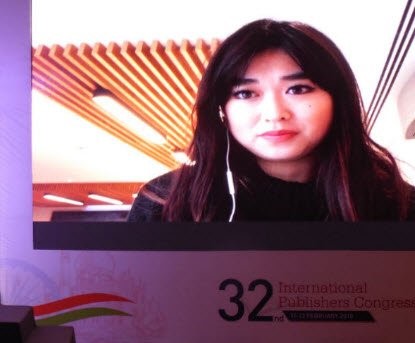Hello everyone, my name is Angela Gui and I’m Gui Minhai’s daughter.
Today I’m extremely proud of my father’s achievements, but I’d actually like to begin by expressing my disappointment.
The talented and creative writers over at the Chinese Communist Party didn’t respond to my request for them to provide me with a script for this speech, so I’m afraid that a few words from me and my perspective will have to do this evening.
In light of recent events I could use this time to talk about all the other things that I’m feeling. But I don’t suppose ‘disappointment’, or any other word for that matter, adequately covers any of that. So instead I’d like to take this time to talk about who my father is, as opposed to what happened to him, to perhaps give you a sense of what being awarded this prize means to him.
My father has always been a storyteller. As a child I used to look forward to just walking places with him, because he had the ability to find little anecdotes around every corner that we passed.
He was born in 1964 into a family to which the Communist Revolution had been rather unkind. As a child he was already severely near-sighted and needed glasses to see. My grandparents managed to save up for a pair, but because of the cost of glasses relative to the family’s meagre earnings, my father wasn’t allowed to play outside with other children in case the glasses would break. Instead he would stay indoors and read stories. In the 1980s he studied history in Beijing. China was opening up to foreign influences for the first time in nearly a century, and my father and his friends explored this not only through their studies, but also through reading and writing poetry about dreams of social change.
When my father met me for the first time, moments after I had been born, I apparently grabbed the pen that he always carried in his breast pocket and pulled it out. He tells people that that’s how he knew that like him, I would be a writer. And I don’t know about that – but he was the one who taught me to use PowerPoint as a nine-year-old, so I could build visual narratives and arguments. He was my first critic when I started writing essays for school. He’s told so many stories, and enabled so many stories to be told. Even if my father was somehow right that I was meant to be a writer, I am finding it incredibly difficult to do justice to his story. So instead of trying too hard, let me move on to a little anecdote of my own.
I read Voltaire’s Candide as a sixteen-year-old. My teenage self, who I admit is likely to be wrong, read it as less of an outright rejection of optimism, and more of a realistic redefinition of its meaning. Voltaire doesn’t think that being a true optimist means believing that ‘all is for the best in the best of all worlds’. Instead true optimism stems from the insight that the world is actually quite awful, because that introduces the possibility of things becoming better – and more importantly, and a will to make this happen. As Candide says at the end, ‘we must cultivate our garden’. The reason I’m telling you this is that when I heard the news that my father was to be awarded this prize, its name made me recall a very particular conversation I had with him in December 2017 when he was under residential surveillance. He wasn’t able to recount in very specific terms what had happened to him and what his situation was, but he did tell me this: ‘despite everything that has happened, I remain an optimist.’
And I think that my father’s version of optimism is perhaps precisely the kind that Voltaire describes. It’s an optimism that in the face of unimaginable cruelty still believes in change. And it’s an optimism that isn’t crushed by lies, force and humiliation.
So I don’t know what part of my understanding of this prize makes my father a more worthy winner of it: his courage, or his optimism. Maybe it’s a bit of both. But I do think that if my father was here to receive his award instead of me, as he should’ve been, he would probably say something – in the spirit of Voltaire – along the lines of ‘we must cultivate our garden’.
Thank you.

